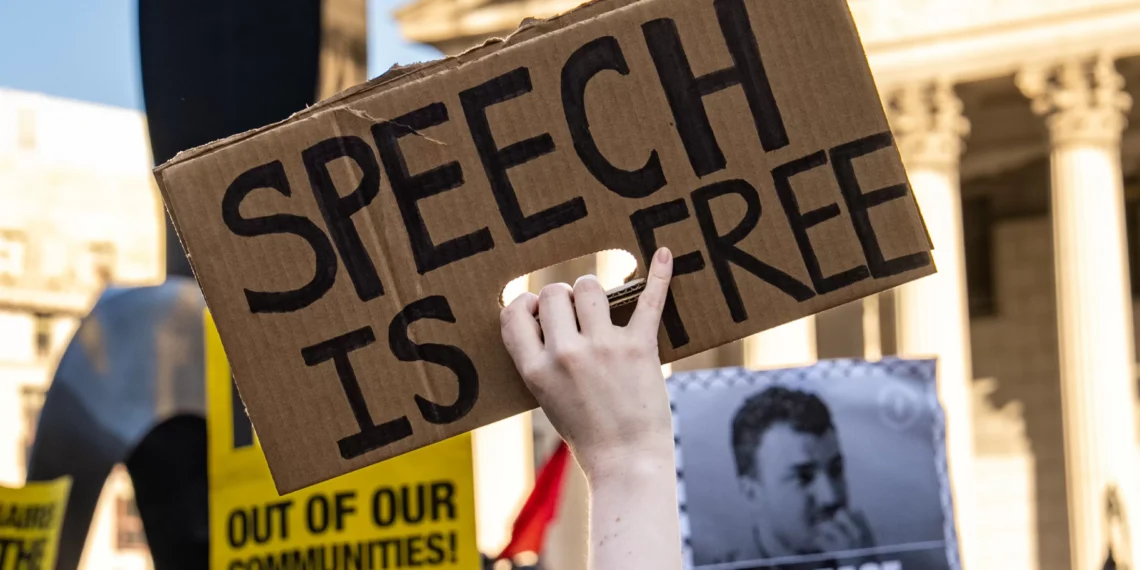In recent years, the term “cancel culture” has become a buzzword, often used by conservative critics to describe the supposed silencing of free speech. However, their defense of free speech seems to have a limit when it comes to pro-Palestine speech. This was made evident in the case of Mahmoud Khalil, a Palestinian activist who was targeted by the Trump administration for deportation due to his political views.
Mahmoud Khalil, a 22-year-old Palestinian student, came to the United States in 2016 to pursue his education. He was a vocal advocate for Palestinian rights and often spoke out against the Israeli occupation and human rights violations. However, his activism caught the attention of the Trump administration, which saw his views as a threat to their pro-Israel agenda.
In October 2019, Khalil was arrested by Immigration and Customs Enforcement (ICE) and placed in deportation proceedings. The reason? His political speech. The Trump administration argued that Khalil’s support for the Boycott, Divestment, and Sanctions (BDS) movement, which calls for economic pressure on Israel to end its occupation of Palestinian territories, made him a security threat and therefore, he should be deported.
Conservative critics of “cancel culture” were quick to defend the Trump administration’s actions, citing national security concerns and the need to protect free speech. However, their hypocrisy was exposed when it was revealed that Khalil’s deportation was not based on any criminal activity or threat to national security, but solely on his political views.
It is ironic that the same people who claim to champion free speech and criticize “cancel culture” are the ones supporting the silencing of a young Palestinian activist. This is not the first time that pro-Palestine speech has been targeted and labeled as a threat. In fact, the suppression of pro-Palestine voices has been a long-standing issue in the United States.
The pro-Israel lobby has a strong influence in American politics and has worked tirelessly to silence any criticism of Israel’s policies. This has resulted in the suppression of pro-Palestine speech on college campuses, in the media, and even in political circles. The case of Mahmoud Khalil is just one example of the ongoing efforts to silence pro-Palestine voices.
The hypocrisy of the right-wing’s defense of free speech is further highlighted by their support for laws that criminalize the BDS movement. Several states have passed laws that penalize individuals and organizations that support BDS, violating their right to free speech. These laws not only silence pro-Palestine speech but also undermine the fundamental principle of free speech.
The case of Mahmoud Khalil is not just about one individual, but it is a reflection of the larger issue of the suppression of pro-Palestine speech. It is a reminder that the right-wing’s defense of free speech is selective and only applies to speech that aligns with their agenda. Any speech that challenges their beliefs or threatens their interests is labeled as a threat and silenced.
The right-wing’s love for free speech is conditional, and it is time to call out their hypocrisy. Free speech should not be limited to certain political views or agendas. It should be a fundamental right that is protected and respected for all individuals, regardless of their beliefs.
As the case of Mahmoud Khalil gained attention, many organizations and individuals came together to support him and speak out against his deportation. This solidarity and support are crucial in the fight against the suppression of free speech. It is heartening to see people from different backgrounds and beliefs coming together to defend the right to free speech.
In the end, the Trump administration’s attempt to deport Mahmoud Khalil was unsuccessful, and he was allowed to stay in the United States. However, this case serves as a reminder that the fight for free speech is ongoing and that we must remain vigilant against any attempts to silence it.
In conclusion, the right-wing’s defense of free speech is hypocritical when it comes to pro-Palestine speech. The case of Mahmoud Khalil is just one example of the ongoing suppression of pro-Palestine voices in the United States. It is time to call out this hypocrisy and stand in solidarity with those whose free speech is being threatened. Free speech should not be a privilege, but a fundamental right for all individuals.







